November 29th, 2013
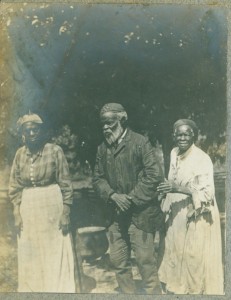
In preparation for the Tennessee State Museum exhibit, Slaves and Slaveholders of Wessyngton Plantation, descendants have been asked to locate Wessyngton artifacts, photographs, paintings and other memorabilia. A descendant of the owners of Wessyngton living in Nashville recently discovered this photograph in an album that belonged to his grandmother. The photograph was taken at Wessyngton in 1903, featuring Jenny Washington b. 1830, (wife of Allen Washington), Emanuel Washington 1824-1907 and his sister Susan Washington b. 1821. When the photo was taken there were only five former slaves still at Wessyngton of the senior generation, which also included Henny Washington 1839-1913 and Aggy Washington Terry, b.1824.
Tags: Aggy Washington Terry, Allen Washington, Emanuel Washington, Henny Washington, Jenny Washington, Slavery, Slaves and Slaveholders of Wessyngton Plantation, Susan Washington, Tennessee slavery, Tennessee Slaves, Tennessee State Museum, Uncle Man, Wessyngton Exhibit
Posted in Book Tour & Reviews, Civil War, Genealogy & DNA, Interviews, Introduction & Personal, Plantation Life, Uncategorized | Comments Closed
November 29th, 2012
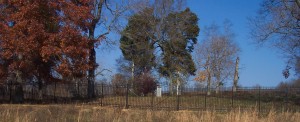 Wessyngton African American Cemetery 1796 to 1928
Wessyngton African American Cemetery 1796 to 1928
The African American Cemetery on Wessyngton Plantation was founded by Joseph Washington who came to Robertson County, Tennessee from Southampton County, Virginia in 1796. Joseph later returned to Virginia and brought African and African American slaves with him. The cemetery was used by the enslaved African American population of the plantation and their descendants from 1796 to 1928.
In 1995 a memorial monument at the African American Cemetery was erected by Mary Washington Holley, Thomas Blagden and Preston Frazer, direct descendants of Wessyngton’s founder Joseph Washington. It honors those buried there.
In 2012 a beautiful six-foot aluminum fence was erected to enclose and protect the cemetery. The fence adds charm and dignity to the cemetery. Special thanks go to Stanley Frazer Rose, a sixth generation descendant of Joseph Washington, for his generosity in funding this renovation.
The African American cemetery is located some distance from the Wessyngton mansion on a hill overlooking Caleb’s Creek. This is near where Joseph and his slaves first settled in 1796. The cemetery measures approximately 640 square feet and contains an estimated 200 graves. A geophysical survey using ground penetrating radar is planned to determine the actual number of graves in the cemetery. At that time, the original monument will be enlarged to honor all those who were buried in the cemetery. This monument will be funded in part by Mary Hotchkiss Gregg, Robina Gregg O’Rourke, Robert Etheridge Gregg, and Robert Hunnewell Gregg, sixth generation descendants of Joseph Washington.
Based on correspondence and plantation records from the Washington Family Papers collections, death certificates, oral history and eyewitnesses who attended burials at the cemetery, the following persons are known to be buried there:
Sampson Washington 1808 –1836
Caesar Washington 1826-before 1838
Elijah Washington 1823-before 1838
Matt Washington 1777-before 1838
Nicholas Washington 1822-before 1838
Noel Washington 1804-before 1838
Oscar Washington 1825-before1838
Peter Washington 1823-before 1838
Sam Washington 1770-before 1838
Sam Washington 1770-before 1838
Samuel Washington 1770-before 1838
Simon Washington 1783-1835-before 1838
Cherry Washington 1839-1839
Will Washington 1820-1841
Boyd Washington 1840-1846
Mariah Washington 1798-1846
Godfrey Washington 1787-1846-before 1850
Rosetta Washington 1827-1850
Camilla Lewis 1834-1852
Maria Washington 1853-1853
Wendy Washington 1853-1853
Westley Washington 1853-1853
Otho Lewis 1838-1854
Edward Washington 1834-before 1856
Al Washington ?-1838-before1856
Andrew Washington ?-1838-before 1856
Fowler Terry 1815-1838-before 1856
Simon Washington 1815-1838-before 1856
Toby Washington ?-1838-before 1856
Tony White 1820-1838-before 1856
Westley Washington 1822-1838-before 1856
Daniel Washington 1808-1841-before 1856
Wallis Washington 1822-1841-before 1856
Anthony Washington 1823-1843-before 1856
Archer Washington 1824-1843-before1856
Charles Washington 1809-1843-before 1856
George Lewis 1785-1843-before 1856
Jim Washington 1801-1844-before 1856
Aleck Washington 1795-1846-before 1856
Norfleet Washington 1846-before 1856
Tom Washington 1783-1846-before 1856
Gabriel Washington 1819-1850-before 1856
Dempry Washington 1837-1856
Ned Washington 1844-1856
Silvah Washington 1817-1823-before 1860
Charity Washington 1828-before 1860
Martha Ann Washington 1833-before 1860
Martha Washington 1835-before 1860
Sarah Washington 1840-before 1860
Arry Leavell Washington 1805-1841-before 1860
Sally Washington 1816-1829-before 1860
Mira Washington 1829-1842-before 1860
Sylvia Washington 1806-1842-before1860
Bena Washington 1770?-1844-before 1860
Tom Washington 1782-1846-before 1850
Easter Washington 1784-1850-before 1860
Henny Jackson Smith 1790-1850-before 1860
Jenny Washington 1760-1850-before1860
Unknown male 1785-1850-before 1860
Willie Washington 1820-1850-before 1860
Angelina Cheatham Washington 1814-1851-before 1860
Millie Washington 1851-before 1860
Allen Washington 1813-1856-before 1860
Mose Terry 1810-1856-before 1860
Westley Washington 1830-1856-before 1860
Hannah Washington 1780-1801-before 1860
Juda Washington 1775-1801-before 1860
Nanny Washington 1802-1804-before 1860
Rhoda Washington 1814-1819-before 1860
Fanny Washington 1815-1831-before 1860
Peggy Lewis 1795-1843-before 1860
Lettuce Washington 1857-before1860
Green Cheatham 1817-1860
Jack Washington 1849-1860
Marian Lewis ?-1843-1860
Temperance Washington 1795-1861
Amanda Washington 1837-1863
Aaron Gardner 1804-1860-before 1865
Esther Washington 1775-1860-before 1865
Jenny Washington 1785-1860-before 1865
Sarah Washington 1810-before 1865
Jack Washington 1859-1865
Moses Lewis 1857-1866
Vina Washington 1843-1869
America Washington 1815-1870-before 1880
Humphrey Washington 1797-1870-before 1880
Jenny Blow Washington 1792-1870-before 1880
Cornelia Washington 1859-1882
Axum Washington 1808-1880-before 1890
Britain Washington 1800-1880-before 1890
Hannah Washington 1808-1880-before 1890
Prudence Washington 1819-1893
Allen Washington 1825-1890-before 1895
Emanuel Washington 1824-1907
Jenny Washington 1830-1900-before 1910
Winnie Washington Long Biggers 1860-1900-before 1910
Henny Washington 1839-1913
Sarah Washington Cheatham 1810-1914
Hezekiah Tom Washington 1850-1918
Henry Drake 1868-1928
Tags: Adams Tennessee, African American Family, African American Genealogy, African American History, Bell Witch, Black Genealogy, Black History Month, Burial ground, Cedar Hill Tennessee, Cemetery fencing, Civil War, DNA Testing, Emancipation, Family's Journey to Freedom, Geophysical survey, ghosts, Joseph Washington, Oral History, Sesquicentennial, Slave burials, Slave Cemetery, Slave funerals, Slavery, Stanley Frazer Rose, Tennessee slavery, tobacco plantation, Washington Cemetery, Wessyngton Cemetery, Wessyngton Farms, Wessyngton Plantation Cemetery
Posted in Book Tour & Reviews, Civil War, Current Events, Genealogy & DNA, Interviews, Introduction & Personal, Plantation Life, Research, Uncategorized | Comments Closed
July 26th, 2011
On August 20th through 21st the Gardner family will celebrate their 77th annual family reunion in Springfield, Tennessee. The Gardners have held a reunion on the same date each year since 1935. The Gardner family is one of the largest African American families in Robertson County, Tennessee. I am currently working on a family tree for the reunion which includes nearly 800 direct descendants from Aaron and Betty Gardner. Aaron and Betty along with their three sons, Daniel, George and Jackson were enslaved on the Wessyngton Plantation from 1839 to 1865. The reunion will include a tour of the Wessyngton Plantation.
Tags: Aaron Gardner, Betty Gardner, Black Family Reunion, Gardner Family Reunion, Gardner family tree, Springfield, Tennessee, Wessyngton Plantation
Posted in Uncategorized | Comments Closed
July 26th, 2011
On August 13th the Terry family will celebrate their bi-annual family reunion in Springfield, Tennessee. The reunion festivities will include a tour of Wessyngton Plantation. Hundreds of descendants across the country will attend the reunion. The Terry family is one of the largest families from Wessyngton with over 1,000 descendants, spanning eleven generations from their first ancestors, Dick Terry and Aggie Washington Terry.
Tags: Aggie Washington Terry, Black Family Reunion, Dick Terry, family tree, Springfield, Tennessee, Terry Family Reunion
Posted in Book Tour & Reviews, Civil War, Current Events, Genealogy & DNA, Interviews, Introduction & Personal, Plantation Life, Research, Uncategorized | Comments Closed
July 26th, 2011
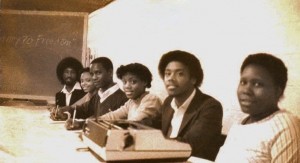
John Baker and Friends at Greater South Baptist Church, 1981
Recently while going through some old photographs, I ran across this one taken with childhood friends Wanda Gardner, Drextel Bowling, Teresa Gardner, Charles Gardner and Kim Bradley. The photo was taken in 1981 at Greater South Baptist Church during a Black history lesson. I was quite surprised when I noticed the blackboard behind me had part of the subtitle to my book Journey to Freedom in the background nearly thirty years before the book was published. My publishers at Atria Books, a Division of Simon & Schuster selected the subtitle for The Washingtons of Wessyngton Plantation.
Tags: Atria Books, black history, Charles Gardner, Drextel Bowling, Greater South Baptist Church, John F. Baker Jr., Kim Bradley, photographs, Simon & Schuster, Subtitle, Teresa Gardner, Wanda Gardner, Wessyngton Plantation
Posted in Book Tour & Reviews, Civil War, Current Events, Genealogy & DNA, Interviews, Introduction & Personal, Plantation Life, Research | Comments Closed
May 23rd, 2011
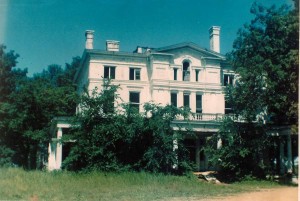
Washington Hall
On May 3rd, I had the honor of giving a presentation on The Washingtons of Wessyngton Plantation to the Austin Peay Women’s Book Club in Clarksville, Tennessee. To my surprise, one of the book club members presented me with a photo of Washington Hall taken in 1965 a few months before it burned.
George Augustine Washington Jr. and his wife Marina “Queenie” Woods, began construction on the magnificent home in 1896. Washington Hall was a three-story white brick mansion with forty-four rooms. In its heyday Washington Hall was one of the showplaces in the South, where some of the crowned heads of Europe had been entertained.
In 1965 the Washington Hall mansion burned to the ground. The grand entrance gate is the only remnant of its former glory.
Tags: George Augustine Washington, Glenraven, Queenie Woods Washington, Southern Homes, southern hospitality, southern mansions, Washington family, Washington Hall, Wessyngton
Posted in Book Tour & Reviews, Civil War, Current Events, Genealogy & DNA, Interviews, Introduction & Personal, Plantation Life, Research | Comments Closed
April 17th, 2011
The entire Court Order book collection of the Southampton County, Virginia Court from 1749 through the early 1880s has been digitalized. This includes 57,000 pages, involving approximately one million names. This information is free online at: www.wiki.familysearch.org/en/Southampton_County,_Virginia. This collection is a goldmine for African Americans tracing their ancestors who once lived in Southampton County. Many of the books that have been digitized were 300 to 700 pages. Court Order books from the 1700s to the end of the slave trade lists the names of Africans when they were first brought to the area, their ages, owner’s names, and in a few cases the ships on which they were brought over. Wills and estate settlements lists the names of slaves, descriptions and family relationships. If your ancestors came from Southampton County, Virginia, you must check out this collection. Thanks go to Southampton Circuit Court Clerk, Richard Francis, and the volunteers of the Brantley Association of America who undertook this huge project in 2009 and 2010.
Tags: African American History, African American slavery, African History, African Slavery, African Slaves, Ancestr.com, Brantley Association of America, Brantley Family Association, Civil War, Colonial Virginia, Court Orders, Digital Record Research, Emancipation, Richard Francis, runaway slaves, Slave Family, Slave Records, Slave Research, Slave Revolts, slave trade, Slaves, Southampton County Virginia Genealogy, Southampton County Virgnia, Titheables, Transatlantic Slave Trade, Virginia Slavery
Posted in Book Tour & Reviews, Civil War, Current Events, Genealogy & DNA, Interviews, Introduction & Personal, Plantation Life, Research | Comments Closed
April 11th, 2011
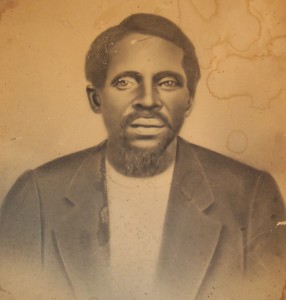
Daniel Gardner 1829-1911
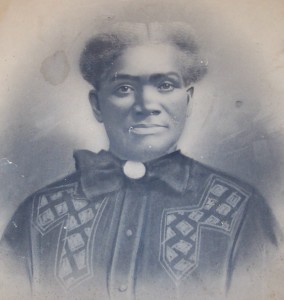
Melissa Boisseau Gardner 1838-1931
In August 2010 the Gardner family celebrated their 76th annual family reunion. The festivities included a tour of Wessyngton Plantation. Aaron Gardner born 1804, his wife Betty born 1814, and their three sons Daniel Gardner 1829-1911, George Gardner 1830-1906, and Jackson Gardner Washington born 1831 were enslaved on the plantation from 1839 to 1865. After emancipation George Gardner purchased 169 acres of land, which he willed to his nephew Will Gardner. Daniel Gardner and his wife Melissa Boisseau Gardner were the parents of eighteen children. Many of their descendants remain in the Robertson County area. There are more African Americans carrying the Gardner surname than any other surname in the county. Two original portraits of Daniel and Melissa Gardner were revealed to descendants at the 76th Gardner family reunion.
Tags: African American Family Reunions, Black Family Reunion, Daniel Gardner, Famil Reunions, Family Reunion Tour, Gardner Family Reunion, Melissa Boisseau Gardner, Wessyngton Plantation
Posted in Book Tour & Reviews, Civil War, Current Events, Genealogy & DNA, Interviews, Introduction & Personal, Plantation Life, Research | Comments Closed
March 2nd, 2011
According to an interesting article by Jesse Washington of the Associated Press entitled “Washington Named the ‘Blackest Name’ in America,”
Based on the 2000 U. S. census, Washington is the most prominent surname among African Americans. 90% of 163,036 individuals with the Washington surname are African Americans, a far greater percentage than any other name.
The descendants of African Americans once enslaved on Wessyngton Plantation are part of this group. Before and after Emancipation, they chose to use the Washington surname—the surname of the slaveholding Washington family (were distant cousins of the president).
At the onset of the Civil War there were nearly 300 African Americans on Wessyngton Plantation. In 1870, 212 former slaves and their descendants from Wessyngton in Robertson County carried the Washington surname. This was nearly 5% of the total number of African Americans in the county.
In the years following the Civil War hundreds of Washingtons from Robertson County migrated out of the area. Today there are still African Americans in the area who carry the Washington surname (although far fewer than decades earlier), and some African American Washingtons throughout the country are descended from the Wessyngton Washingtons.
Tags: African American Surnames, African American Washingtons, African Names, American Names, Associated Press, Blackest Surname in American, Jesse Washington, Names in America, Surnames, Surnames in America, Washington, Washington Surname
Posted in Civil War, Current Events, Genealogy & DNA, Interviews, Introduction & Personal, Plantation Life, Research | Comments Closed
January 19th, 2011
Elijah Smyth or Smith was originally owned by Joseph L. D. Smith on his plantation in Florence, Alabama. When Joseph Smith died in 1837, Elijah was inherited by Smith’s minor daughter Jane, who later married George Augustine Washington of Wessyngton Plantation.
Between 1850 and 1860, Elijah Smyth made his escape from slavery in Alabama most likely using the Underground Railroad. He made it to freedom in Buxton, Canada. Buxton, was established in 1849 by the abolitionist Reverend William King, and was one of four settlements in Canada which offered refuge for fugitive slaves. Buxton was located between Lake Erie and the Great Western railway, and consisted of approximately 9,000 acres of land. The logging industry provided an income for most of its residents.
Reverend King had strict guidelines for the settlers: land could not be leased, and could only be purchased by African Americans for $2.50 per acres. Once the land was purchased it had to be held for ten years. Houses had to be built that were at least 24 x 18 x 12 feet with a porch, and picket fence and flower garden in front. The town had four churches, three schools, a hotel and its own post office. In 1860, Buxton’s population was its largest with about 700 residents.
Elijah Smyth was literate. Since educating slaves was forbidden by law in Alabama, he probably was educated at the Buxton school.
Between 1850 and 1860, Elijah Smyth wrote a letter to Jane Smith’s aunt, Anne Pope. He sent the letter from Buxton, Canada.
Mrs. Pope,
Will you be so kind as I do not know who my young Mrs. is married to or where she lives. The least she will take for my papers of liberty as I am ready to pay a reasonable price. It is better for her to get a half loaf than no bread. If she will take a reasonable price write to me and then I will write to you and let you know what day to have a man in Detroit with my papers and will send the money by a friend to meet him. Be so kind as to write to me in haste.
No more but kindness,
Yours truly Elijah Smyth
[Washington Family Papers]
In the letter Elijah Smyth offered to purchase his freedom. It is unknown why he made the offer since he was already free. He might have wanted to purchase the freedom of other family members who were still enslaved. It also is not known whether Jane Smith responded to his letter or accepted his offer.
Tags: Anne Hanna Pope, Buxton, Buxton Canada, Cotton Plantation, Emancipation, Florence Alabama, Forks of Cypress, Free Papers, Freedom, From Slavery to Freedom, Jane Smith Washington, Joseph L. D. Smith, Reverend William King, runaway slaves, Slave Rebels, Underground Railroad, Wessyngton Plantation
Posted in Book Tour & Reviews, Civil War, Current Events, Genealogy & DNA, Interviews, Introduction & Personal, Plantation Life, Research | Comments Closed





